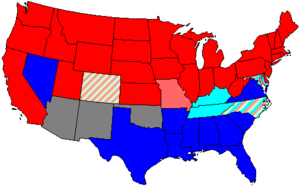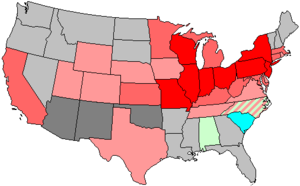
United States House election, 1894
Encyclopedia
The U.S. House election, 1894 was a realigning election
—a major Republican landslide that set the stage for the decisive Election of 1896. The elections of members of the United States House of Representatives
in 1894 came in the middle of President
Grover Cleveland
's second term. The nation was in its deepest economic depression ever following the Panic of 1893
, so economic issues were at the forefront. In the spring, a major coal strike damaged the economy of the Midwest and Mid-Atlantic
. It was accompanied by violence; the miners lost and many moved toward the Populist party. Immediately after the coal strike concluded, Eugene V. Debs
led a nationwide railroad strike, called the Pullman Strike
. It shut down the nation's transportation system west of Detroit for weeks, until President Cleveland's use of federal troops ended the strike. Debs went to prison (for disobeying a court order). Illinois' Governor John Peter Altgeld
, a Democrat, broke bitterly with Cleveland.
The fragmented and disoriented Democratic Party
was crushed everywhere outside the South, losing more than half its seats to the Republican Party
. Even in the South, the Democrats lost seats to Republican-Populist electoral fusion
in Alabama, Texas, Tennessee, and North Carolina. The Democrats lost 125 seats in the election while the Republicans gained 130 seats. This makes the 1894 election the largest midterm election victory in the entire history of the United States
.
The main issues revolved around the severe economic depression, which the Republicans blamed on the conservative Bourbon Democrats led by Cleveland. Cleveland supporters lost heavily, weakening their hold on the party and setting the stage for an 1896 takeover by the silverist wing of the party. The Populist Party ran candidates in the South and Midwest, but generally lost ground, outside Alabama, North Carolina, Tennessee, and Texas where state-level fusion with the Republicans was successful despite Populist and Republican antagonism at the national level. The Democrats tried to raise a religious issue, claiming the GOP was in cahoots with the American Protective Association
. The allegations seem to have fallen flat as Catholics moved toward the GOP. [Jensen (1971) ch 9]. Democrat William Jennings Bryan
lost the Senate race in Nebraska, but came back to win the 1896 presidential nomination.
Realigning election
Realigning election are terms from political science and political history describing a dramatic change in the political system. Scholars frequently apply the term to American elections and occasionally to other countries...
—a major Republican landslide that set the stage for the decisive Election of 1896. The elections of members of the United States House of Representatives
United States House of Representatives
The United States House of Representatives is one of the two Houses of the United States Congress, the bicameral legislature which also includes the Senate.The composition and powers of the House are established in Article One of the Constitution...
in 1894 came in the middle of President
President of the United States
The President of the United States of America is the head of state and head of government of the United States. The president leads the executive branch of the federal government and is the commander-in-chief of the United States Armed Forces....
Grover Cleveland
Grover Cleveland
Stephen Grover Cleveland was the 22nd and 24th president of the United States. Cleveland is the only president to serve two non-consecutive terms and therefore is the only individual to be counted twice in the numbering of the presidents...
's second term. The nation was in its deepest economic depression ever following the Panic of 1893
Panic of 1893
The Panic of 1893 was a serious economic depression in the United States that began in 1893. Similar to the Panic of 1873, this panic was marked by the collapse of railroad overbuilding and shaky railroad financing which set off a series of bank failures...
, so economic issues were at the forefront. In the spring, a major coal strike damaged the economy of the Midwest and Mid-Atlantic
Mid-Atlantic States
The Mid-Atlantic states, also called middle Atlantic states or simply the mid Atlantic, form a region of the United States generally located between New England and the South...
. It was accompanied by violence; the miners lost and many moved toward the Populist party. Immediately after the coal strike concluded, Eugene V. Debs
Eugene V. Debs
Eugene Victor Debs was an American union leader, one of the founding members of the International Labor Union and the Industrial Workers of the World , and several times the candidate of the Socialist Party of America for President of the United States...
led a nationwide railroad strike, called the Pullman Strike
Pullman Strike
The Pullman Strike was a nationwide conflict between labor unions and railroads that occurred in the United States in 1894. The conflict began in the town of Pullman, Illinois on May 11 when approximately 3,000 employees of the Pullman Palace Car Company began a wildcat strike in response to recent...
. It shut down the nation's transportation system west of Detroit for weeks, until President Cleveland's use of federal troops ended the strike. Debs went to prison (for disobeying a court order). Illinois' Governor John Peter Altgeld
John Peter Altgeld
John Peter Altgeld was the 20th Governor of the U.S. state of Illinois from 1893 until 1897. He was the first Democratic governor of that state since the 1850s...
, a Democrat, broke bitterly with Cleveland.
The fragmented and disoriented Democratic Party
History of the United States Democratic Party
The history of the Democratic Party of the United States is an account of the oldest political party in the United States and arguably the oldest democratic party in the world....
was crushed everywhere outside the South, losing more than half its seats to the Republican Party
History of the United States Republican Party
The United States Republican Party is the second oldest currently existing political party in the United States after its great rival, the Democratic Party. It emerged in 1854 to combat the Kansas Nebraska Act which threatened to extend slavery into the territories, and to promote more vigorous...
. Even in the South, the Democrats lost seats to Republican-Populist electoral fusion
Electoral fusion
Electoral fusion is an arrangement where two or more political parties on a ballot list the same candidate, pooling the votes for that candidate...
in Alabama, Texas, Tennessee, and North Carolina. The Democrats lost 125 seats in the election while the Republicans gained 130 seats. This makes the 1894 election the largest midterm election victory in the entire history of the United States
History of the United States
The history of the United States traditionally starts with the Declaration of Independence in the year 1776, although its territory was inhabited by Native Americans since prehistoric times and then by European colonists who followed the voyages of Christopher Columbus starting in 1492. The...
.
The main issues revolved around the severe economic depression, which the Republicans blamed on the conservative Bourbon Democrats led by Cleveland. Cleveland supporters lost heavily, weakening their hold on the party and setting the stage for an 1896 takeover by the silverist wing of the party. The Populist Party ran candidates in the South and Midwest, but generally lost ground, outside Alabama, North Carolina, Tennessee, and Texas where state-level fusion with the Republicans was successful despite Populist and Republican antagonism at the national level. The Democrats tried to raise a religious issue, claiming the GOP was in cahoots with the American Protective Association
American Protective Association
The American Protective Association, or APA was an American anti-Catholic society similar to the Know Nothings.-History:The APA was founded 13 March 1887 by Attorney Henry F. Bowers in Clinton, Iowa...
. The allegations seem to have fallen flat as Catholics moved toward the GOP. [Jensen (1971) ch 9]. Democrat William Jennings Bryan
William Jennings Bryan
William Jennings Bryan was an American politician in the late-19th and early-20th centuries. He was a dominant force in the liberal wing of the Democratic Party, standing three times as its candidate for President of the United States...
lost the Senate race in Nebraska, but came back to win the 1896 presidential nomination.
Overall results
| Party | Total seats (change) | Seat percentage | |
|---|---|---|---|
| Republican Party | 254 | 130 | 71.1% |
| Democratic Party | 93 | 125 | 26.0% |
| Populist Party | 9 | 2 | 2.5% |
| Other | 1 | 0 | 0.2% |
| Independents Independent (politician) In politics, an independent or non-party politician is an individual not affiliated to any political party. Independents may hold a centrist viewpoint between those of major political parties, a viewpoint more extreme than any major party, or they may have a viewpoint based on issues that they do... |
0 | 2 | 0.0% |
| Totals | 357 | 1 | 100.0% |
 |
 |
See also
- 54th United States Congress54th United States Congress- House of Representatives :-Leadership:- Senate :* President: Adlai E. Stevenson * President pro tempore: William P. Frye - Majority leadership :* Republican Conference Chairman: John Sherman- Minority leadership :...
- United States Senate elections, 1894

